- July 26, 2024
-
-
Loading

Loading

William Shakespeare’s “Twelfth Night” is now bending genders in the Asolo Conservatory’s final production for this season.
The play’s title refers to the Feast of the Epiphany on the 12th day of Christmas.
In the old Christian calendar, that’s the day Jesus revealed his divine identity to the three Magi. The reference is fitting for this play. Because Shakespeare’s play is all about revelation — both sacred and profane.
The plot is a convoluted mirror maze of double identities and parallel stories. Here’s a short version to help find your way through.
Brother and sister twins, Sebastian (Evan Stevens) and Viola (Erin O’Connor), are lost at sea. Each believes the other one drowned.
The young woman washes up in a strange city. For convoluted reasons, she pretends to be a young man — aka “Cesario” — and enters the court of Duke Orsino (Jerald Wheat). Orsino immediately puts “him” to work wooing Olivia (Imani Lee Williams) on his behalf.
But Olivia also judges a book by its cover — and falls in love with Cesario. (Centuries before “Monty Python,” the British loved cross-dressing comedy.) Shenanigans ensue.
After a sword fight or two, Sebastian shows up and reveals Cesario’s true identity. (The “mister” is his sister!)
Once the genders are sorted out, the true lovers all get married. With Sir Toby and Maria (Dreaa Kay Baudy), this takes a court order. There’s also a subplot involving Malvolio — the Shakespearean character you love to hate.
He’s one of the biggest jerks in English drama — a Puritan who loses sleep at night at the thought that somebody, somewhere might be having fun. This production turns Malvolio into Malvolia (Zoya Martin). The gender’s different, but the story remains the same.
Sir Toby Belch (Christian Douglass) and his accomplices trick Malvolia into thinking Olivia (her employer) is in love with her — and wants her to dress like a fool and grin like an idiot. Malvolia does; Olivia is not amused.
Then it gets worse. Revelation is the common thread for both plot lines. The "A" story reveals true love in disguise. The "B" story rips the mask off false virtue. In either story, outward appearance doesn’t match inner reality. But the truth comes out.
Director Jonathan Epstein has fun with Shakespeare’s epiphanies. He eases you into the comedy like a warm bath and doesn’t bludgeon you with big messages. Epstein also turns the play into a mini-musical, with abundant tunes from several Shakespeare plays — along with a sampling of Foreigner’s cheesy “I Want to Know What Love Is.”
Composer Daniel Levy deftly sets Shakespeare’s words to music. His songs fit perfectly in the world of this play.
The rest of the creative team is also having fun. Chris McVicker’s set is a movable feast of unadorned Christmas trees, which the actors move around like chess pieces on the stage. April Carswell’s costumes have an old-timey look without being specific to any literal time period. Alex Pinchin’s sound design is equally dreamy and timeless.
Movement coach Eliza Ladd sprinkles the show with dance and physical comedy. And some snappy fight choreography. Kudos also to voice coach Patricia Delorey for making the Elizabethan screwball comedy dialogue flow in a range of dialects.
The conservatory’s student actors deliver strong performances.
Marcaria Chaparro Martinez and Sydney Story make for two impish jesters. (Festa and Vesta respectively.) Douglass’ Sir Toby Belch is also hilarious — think Falstaff without a weight problem and a ridiculous Southern accent that sounds like John C. Reilly.)
Baudy’s Maria balances common sense with a gleeful sense of mischief.
Williams’ Olivia has a profound gravitas, even when she’s head-over-heels in love with Cesario. O’Connor’s nervous Nellie portrayal of Viola in drag is sometimes funny, sometimes moving. She’s heart-wrenching in the scenes where her dialogue is dense with double meaning. (“I am all the daughters of my father’s house, and all the brothers, too.”)
As to Martin’s Malvolia — wow. As noted, Malvolio’s the character you love to hate. But this time I didn’t.
Why?
This might sound sexist, but flipping the character’s gender also flipped my perception.
The prank on Malvolia now seems cruel — like one of Neil LaBute’s misogynistic attacks on some unsuspecting woman. This production actually made me feel sorry for Malvolia. “Sorry,” as in empathy, sympathy, compassion.
This is the first time I felt any of those emotions. I did because this is the first time this character seemed human to me.
Brava to Martin for bringing her to life and giving her a shred of dignity.
That’s only one of the many revelations this inventive production has to offer.
Come in a suit, a dress or what you will. But don’t miss it.